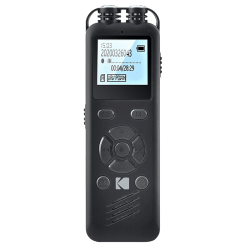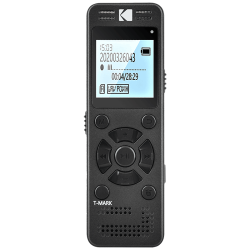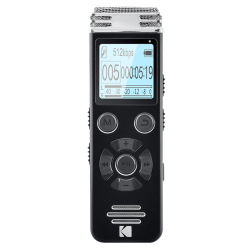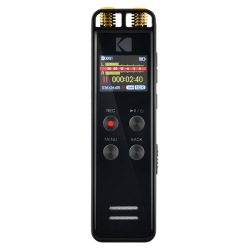Dictaphones, tech gems that you shouldn't dismiss!

A small, lightweight device that records voices and sounds with impeccable clarity. Dictaphones have long been a go-to device for journalists, students, doctors and writers who want to record notes. At Kodak, we think everyone should have a dictaphone, and we're here to tell you why.
The history of the dictaphone
Do you know what an antonomasia is? It's when a proper noun, such as a trademarked name, is used as a common noun. Examples include hoover, lycra, jacuzzi, escalator, frisbee, trampoline and (*drumroll*) dictaphone! The name was trademarked in 1907 by the Columbia Graphophone Company when they launched a dictation recorder. Since then, the word has become part of everyday language.
The first voice recordings date back to the 19th century, but it wasn't until the 1950s that they became more widespread. And we had to wait until the 1990s before these nifty little devices became standard tech. It was also around this time that the first compact cameras appeared! Today, most mobile phones, computers and tablets are equipped with some sort of built-in voice/sound recorder. But that doesn't mean a stand-alone device isn't worth its weight in gold!
Dictaphones are still the only devices specifically designed to record sounds. They're optimised for this purpose. These lightweight, mobile devices are packed with features and settings that produce top-quality voice notes. So they're a hit with professionals who need to record a text that they can listen to again and then put into writing. Recently, students have latched on to the idea, so that they don't miss any information during a class or lecture.
So why a dictaphone and not just a recording app?
We know you're already asking yourself why bother with a dictaphone when your smartphone has a built-in recorder. Well, there's a host of reasons a dictaphone could be a handy addition to your tech:
- Phone recordings will use up precious memory. A dictaphone's memory is entirely dedicated to storing recordings. Depending on the model, it can store up to 700 hours of audio, which can be increased with the addition of an SD card.
- Your phone's recorder will drain your battery if you use it for lengthy recordings. Dictaphones have a battery life of at least 20 hours.
- Plus they can be equipped with tech that vastly improves recording quality: noise reduction, presets, etc.
- You'll benefit from a state-of-the-art microphone with an omnidirectional (360°) channel, meaning it will pick any voice or sound wherever it's placed or aimed.
- Finally, you'll get cool intuitive features to make recording easier, such as voice control and an instant record button.
So you see, dictaphones have a lot going for them! If that's not enough, they're also lightweight and easy to handle. You can take it wherever you go and have a recording device to hand without worrying that your mobile will run out of juice.
So when could you need to use a dictaphone?
If you need convincing, here are times when a dictaphone could save the day. It's not just doctors and lawyers who reap the benefits of these clever little devices. Here are some situations where a dictaphone could be your tech BFF:
1 - You're conducting an interview
Journalists stick to their much-loved dictaphones, despite smartphone technology. You don't have to scribble notes down, and you can record everything you hear and listen to it while writing your article or story. In other words, the use of a dictaphone can guarantee the accuracy of quotes and information you provide.
Researchers and students writing dissertations, theses or research papers also love their dictaphones. Sometimes transcriptions have to be 'verbatim' as in literal, meaning you may have to reproduce every stammer, hesitation, or interrupted word...
2 - When you suddenly have a great idea!
Whether we're a writer, a musician or have a hectic life, our lightbulb moments are often on the spur of the moment! Having a dictaphone in your pocket can be a real game-changer. Whip it out, say (or sing) what's on your mind and listen to it later. Dictaphones are great for creative types!
You may also want to use one when working in a group, for example, to record business brainstorming sessions. You'll capture the flow of ideas and never forget a brilliant idea again.
3 - You're attending a course, meeting or conference
Whether it's a university lecture or a guest speaker at a conference, listening to experts or professors can be fascinating. However, our brains are simply not wired to listen, note down and assimilate information all at the same time.
So reaching for a dictaphone and recording an entire presentation, lecture or company meeting can be of real help. You can then listen to the recording to jog your memory, improve your learning or as a handy aid to written notes.
4 - You're listening to someone or watching a performance that you know you'll want to hear again
Whether it's a concert, a book signing with your favourite author or an artistic performance, a dictaphone will help you relive all the event over and over again. These devices' superb sound quality makes all the difference.
Did you know that dictaphones can be great to take on walks or hikes? Nature lovers will agree: recording the sounds around you or keeping a voice diary makes the great outdoors even more fun! You'll be able to listen to - and perhaps identify - birdsong, and capture the unique sound of the Icelandic wind or the rumblings of an erupting a volcano.
5 - You or your child are in full-on learning mode
Dictaphones are superb teaching aids. Their uses are endless. Are you coming to grips with a foreign language? Record your pronunciation, play it back and help yourself improve.
Parents and teachers are increasingly turning to dictaphones to improve reading and writing skills. Plus kids can record themselves reading out loud in a stress-free environment without being watched or judged. Their parents or teachers can then listen to the recordings and get a better idea of their level and progress. Another fun teaching use is to record a dictation that a child can listen to and transcribe in a calm, distraction-free environment.








